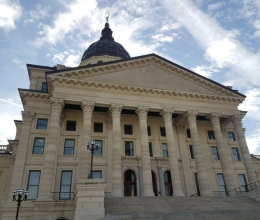
From Ally to Accomplice
In light of the recent increase in anti- LGBTQ+ rhetoric and political attacks in Kansas and across the country, it is crucial that the LGBTQ+ liberation movement continue to gain not only allies, but accomplices.
However, many folks do not understand the difference between allies and accomplices—nor do they know what steps they should be taking to become an effective accomplice in the work toward LGBTQ+ liberation. This short guide will break these terms down and provide folks with resources and information to assist their efforts to become an LGBTQ+ accomplice.
What is an ally and what is an accomplice?
The terms “ally” and “accomplice” are often used to describe those who come from places of privilege and power in their relationship to marginalized groups or individuals. But it is important to realize that these terms are not interchangeable. All accomplices are allies, but not all allies are accomplices.
An ally is often defined as someone who expresses support of an individual or group of a marginalized community. However, this support is typically untethered to meaningful action on behalf of that individual or group, and the ally rarely takes risks as part of their support.
In contrast, an accomplice is often defined as someone who uses the power and privilege they hold to challenge the systems and structures that oppress marginalized individuals or groups, often risking their time; their physical, financial, or mental comfort; or social or professional position in the process.
A helpful metaphor to narrate this difference is that allies are more like cheerleaders, rooting for LGBTQ+ liberation from the sidelines without significantly participating. But accomplices are out on the field, playing the game with members of the community and taking action to further the cause of LGBTQ+ liberation. An ally would attend pride parades and celebrate the community, while an accomplice would attend city council meetings and advocate for LGBTQ+-friendly policies or put their bodies on the line at protests challenging anti-LGBTQ+ policies.
Why is it important to be an accomplice rather than an ally?
While allyship is necessary and important, allyship does not significantly help the LGBTQ+ community fight back against systems of oppression that continue to marginalize and otherize queer and trans people. That is why it is so important the LGBTQ+ liberation movement continues to gain accomplices—people who take their allyship out of the abstract and move it into action and true solidarity.
This is especially important in this moment in history, when LGBTQ+ people are facing unprecedented attacks in the Kansas legislature, in legislatures across the country, and in other local and state institutions. LGBTQ+ Kansans appreciate support from allies, but they need action from accomplices to be able to feel safe in our state and live authentic lives without fear of persecution, discrimination, or violence.
I want to be an accomplice. How can I work toward that goal?
It can be challenging to look inward and analyze whether we are doing the work
to truly be LGBTQ+ accomplices. But it is important to reflect on this question and even more important to be honest with yourself when coming up with the answer. Don’t think of this as a test you pass or fail— think of this as a spectrum of opportunity to grow and continually work toward becoming the LGBTQ+ accomplice you hope to be.
There are lots of things you can do on your own to work toward becoming an accomplice to LGBTQ+ liberation. Below is a list of a few things you could do to get started on this journey:
- Educate yourself and others. Often, folks will look to the community they want to advocate for to learn about the experiences, challenges, and structural barriers they face. But placing this additional labor on the marginalized individual or group is burdensome and unnecessary. Accomplices will seek out their own resources for self-education and will help to educate others as well. And if it is necessary to request labor from someone within the community, accomplices will ensure that labor is paid and utilized equitably.
- Listen to the LGBTQ+ community (especially when you feel uncomfortable). An important skill of accomplices is the ability to listen with an open mind to LGBTQ+ people themselves—especially when what is being shared makes you uncomfortable or challenges your current way of thinking or categorizing the world. Accomplices are aware of the space they take up and are cognizant of ensuring they not only listen to LGBTQ+ people but take their lead in LGBTQ+ liberation work.
-
Understand your privilege and learn to use it for good. Privilege comes in many forms—white people carry significant privilege because of their racial identity, wealthy people carry significant privilege because of their socio-economic status, and heterosexual and cisgender people carry significant privilege because of their sexual orientation or gender identity. It is one thing to acknowledge the privilege that you hold; it is another to begin to wield your privilege for the benefit of an individual or group in a marginalized community. Just as white LGBTQ+ people must learn to use their privilege to support and advocate for Black, brown, and indigenous LGBTQ+ people, LGBTQ+ accomplices must learn to use their privilege to support and advocate for LGBTQ+ people.
-
Know yourself, your skills and your boundaries. Each of us have a role to play to work toward LGBTQ+ liberation. Sometimes, when allies learn of attacks on marginalized people we love and share community with, there is a sense of urgency to react immediately. But this is the time to look to leaders in your community who have already been working and will continue this work after the media peak has passed. Consider what time, resources, and skills you are capable of sharing in a way that works for you for the long haul, not just when reacting to the moment. When we take care of ourselves and each other by knowing ourselves, our boundaries, and taking time to rest and recuperate—we can build organizing communities that are healthy and sustainable.
-
Get engaged with local organizations working toward LGBTQ+ liberation. It’s unfair to expect LGBTQ+ accomplices to create and execute advocacy actions on their own—and that’s not what the LGBTQ+ liberation movement needs, anyhow! Accomplices should certainly learn how to show up in small ways in their daily lives, in their workplaces, and in their communities to act in support of LGBTQ+ people. But they should also reach out to the organizations and activists in their communities to connect with their LGBTQ+ liberation work and figure out how they can be an accomplice to that work. If you’re looking for these types of organizations in Kansas, check out:
- You may also donate to local LGBTQ+ organizations providing mutual aid to trans Kansans, like:
-
Q Space – Pittsburg
-
ACE Foundation – affirmative healthcare essentials for LGBTQ+ Kansans
Documents
Related content

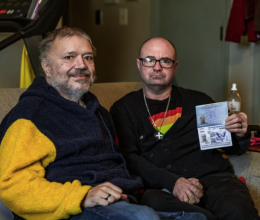
Lawrence couple feels impact of new federal anti-trans policies
March 5, 2025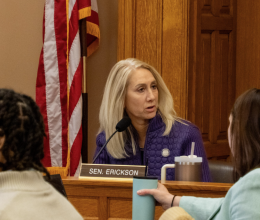
Kansas pronoun bill sparks bipartisan concerns of turning ...
February 19, 2025
Kansas GOP overrides governor’s veto of ban on gender-affirming...
February 19, 2025ACLU of Kansas condemns legislature’s override of governor veto on...
February 19, 2025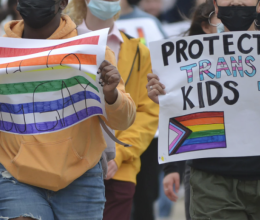
Kansas Republicans override the governor and ban gender-affirming...
February 18, 2025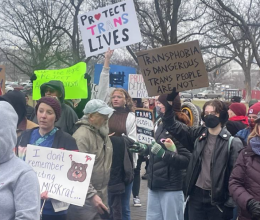
Trans minors in Kansas will no longer have access to care after...
February 18, 2025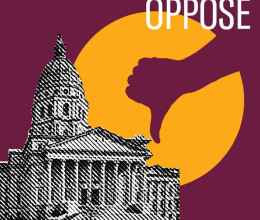
HB 2311: Right to Discriminate Against Foster Youth
February 18, 2025